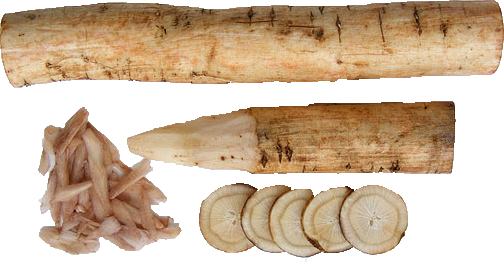|
Burdock roots,
young shoots, peeled stalks, and dried seeds contain numerous compounds that
are known to have anti-oxidant, disease preventing, and health promoting
properties.
The root is very
low in calories; provides about 72 calories per 100 g. Burdock is very good
source of many non-starch polysaccharides such as inulin, glucoside-lappin,
mucilage...etc that help act as good laxative. In addition, inulin acts as
prebiotic helps reduce blood sugar level, weight and cholesterol levels in the
blood.
Burdock root is
especially containing good amounts of electrolyte potassium (308 mg or 6.5% of
daily-required levels per 100 g root) and low in sodium. Potassium is an
important component of cell and body fluids that helps control heart rate and
blood pressure.
It also contains
some valuable minerals such as iron, manganese, magnesium; and small amounts of
zinc, calcium, selenium, and phosphorus.
This herb root
contains small quantities of many vital vitamins including folic acid,
riboflavin, pyridoxine, niacin, vitamin-E, and vitamin-C that are essential for
optimum health. Both vitamin C and E is powerful natural antioxidants help body
stave off infections, cancer and neurologic conditions.
Medicinal uses
Like its
asteraceae family member dandelion, almost all the parts of burdock herb found
place in various traditional as well modern medicines.
Burdock has been
used in many folk remedies as one of the best blood purifiers. It contains
certain diuretic principles, which help expel toxic products from the blood
through urine.
The herb is
employed in the treatment of skin problems such as eczema (dermatitis),
psoriasis, skin dryness...etc. The plant parts have been used as herbal remedy
for liver and gall bladder complaints.
Effusion of
burdock seeds has been used for throat and chest ailments.
Burdock leaves
and stems, in addition to their use as vegetable, have appetite stimulant and
are a good remedy for dyspeptic complaints.
Blood Pressure: One of the aspects of burdock that doesn’t get enough attention
is its impressive ability to lower blood pressure. The plant’s high
concentration of potassium, a vasodilator, helps to relieve tension within the cardiovascular
system by relaxing the blood vessels and arteries, thereby helping to prevent
atherosclerosis, heart attacks, and strokes.
Digestive Issues: The most well-known use of burdock is as a digestive aid for
many different reasons. Firstly, the high concentration of fibres in burdock
help to stimulate the digestive system and move food smoothly through the
bowels, relieving constipation and preventing bloating, cramping, and ulcers.
Inulin, a particular type of fibre found in burdock, is able to reduce
inflammation in the gut and eliminate many types of harmful bacteria that can
cause diarrhoea and other gastrointestinal problems.
Diabetes: Although all types of fibre are able to help regulate the
balance of insulin and glucose in the body, inulin is particularly effective
and has been directly connected to reducing the development and severity of
diabetes and diabetes-related symptoms. The significant levels of insulin in
burdock can also lower overall blood cholesterol by eliminating it from the body,
thereby further protecting your cardiovascular system.
Detoxify the Liver: The same chemicals that give burdock its bitter taste stimulate
bile production and digestive juices in the gut, which helps the liver more
rapidly process toxins and flush them from the system. Clearing toxins from the
blood is one of the main purposes of the liver, and burdock’s organic compounds
and components have been directly linked to improving this function.
Skin Health: One of the most common side effects of constipation, high
toxicity in the blood, or poor dietary habits is skin inflammation, manifesting
as spots, pimples, acne, rashes, or discoloration. Many herbalists recommend
burdock root supplements and herbs for the treatment of skin conditions, as
this powerful herb can solve the underlying problems of toxicity or
constipation in a fast and efficient way, leading to clearer, healthier skin.
Hormonal Balance: Having a hormonal disorder can be destructive and difficult for
your life. To avoid that, you want to add foods and herbs that can regulate
hormonal activity in the body. Burdock is able to help the liver metabolize
certain hormones, like estragon, which can help to rebalance the body’s
hormonal levels to normalcy. Excess estragon is the cause of many dangerous or
even deadly hormonal disorders, so adding some burdock root to your weekly diet
is never a bad idea!
Immune Health: The significant levels of vitamin C and vitamin E, both of
which act as antioxidants in the body to eliminate free radicals, mean that
burdock is a major booster to our immune system function. These antioxidants
have been linked to preventing infections, lowering one’s risk of cancer, and
generally supporting proper growth, development, and repair of the body’s cells
and tissues.
A Final Word of Warning: Although this is somewhat rare, there are limited allergies to
burdock, so be sure to consult a doctor before adding it to your health
regimen. Also, for those people using potassium-sparing diuretic therapy,
eating too much burdock (with its significant levels of potassium) may
aggravate the system and result in potassium toxicity. As always, everything
should be consumed in moderation.
|

